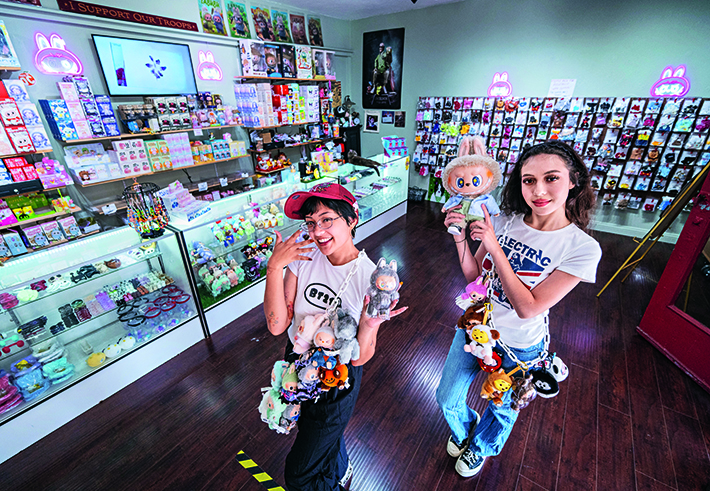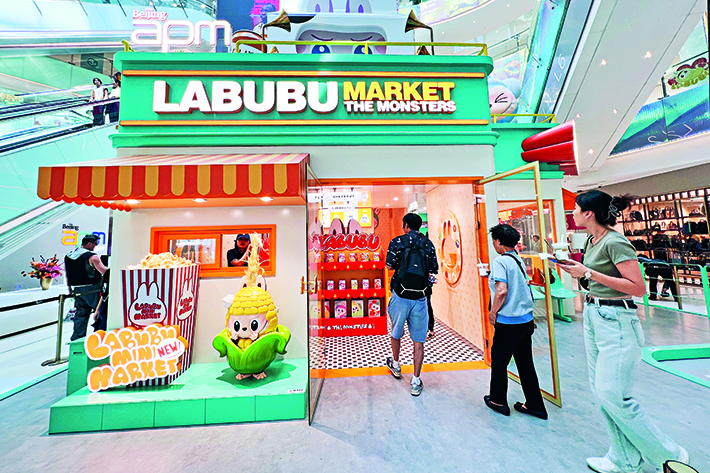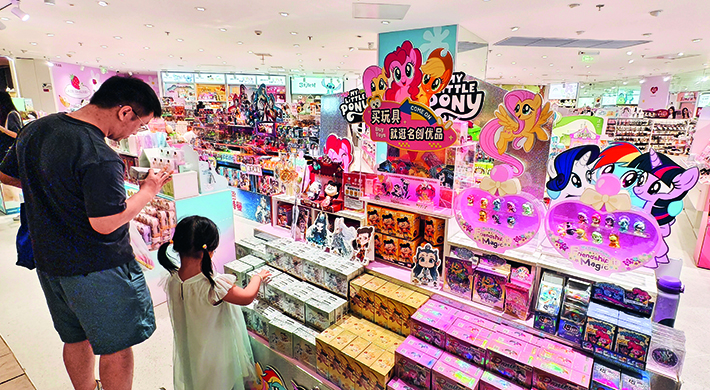|
||||||||||
| Home Top News Economy/Tech Culture/Sports China in Foreign Eyes Green Development Videos Intangible Cultural Heritages |
|
||||||||||
| Home Top News Economy/Tech Culture/Sports China in Foreign Eyes Green Development Videos Intangible Cultural Heritages |
| ChinAfrica |
| The Labubu Effect |
| Chinese designer toys are sparking a global craze with bold designs and cultural flair |
| By XU YING | VOL. 17 November 2025 ·2025-11-05 |

Two customers show off Labubu stuffed animals at the Labu’Tique Shop in Anaheim, US, on 25 June (VCG)
Labubu has become a global star, from Paris and New York to London and Milan. These charming figurines from Chinese toy manufacturer Pop Mart, with their soft fur, expressive eyes, pointed teeth and rabbit ears, have captivated buyers both in shops and online.
The Labubu family is quite extensive, with each character bearing its own name and story. Created in 2015 by Hong Kong artist Kasing Lung for his illustrated book The Monster, the characters were later adapted into soft toys in 2019 through a partnership with Pop Mart.
Founded in 2010, Pop Mart has become a major player in China’s cultural and entertainment scene. Over the past decade, the company has built an integrated platform encompassing the entire designer toy industry. Alongside Pop Mart, many Chinese companies have seen their sales skyrocket, reshaping global perceptions of “Made in China” in the toy industry with their innovative and stylish products.
Emotional value
Labubu has gone viral, thanks to prominent figures on the international stage who have been shouting about it from the rooftops. Whenever a new collection is launched, queues form outside shops all over the world. Videos featuring the figurines are appearing across social media platforms like TikTok and Instagram. Labubu comes in a variety of sizes, allowing fans to mix and match to create their own unique looks, which makes the toys even more collectible. Some limited editions have become quite rare, prompting fans to buy multiple copies.
Pop Mart’s main sales strategy is the “mystery box” - where buyers do not know which model they will receive. “It’s the surprise I get when I open the box that gives me great satisfaction,” said Nana, a young editor based in Beijing. She began collecting different figurines out of curiosity in 2019, but it was not long before her collection took on much deeper meaning.
These days, she seeks out toys that evoke emotion or boast a truly cool design. She owns five Labubu soft toys, attracted by their “slightly offbeat but absolutely adorable” style. Labubu’s image is regarded as “cool,” “independent” and “rebellious,” challenging traditional beauty standards and giving young people a way to express themselves.
Beyond their design, these figurines have become emotionally significant for many, especially younger generations, who see them as a way to relieve stress and find comfort. This emotional connection has also helped collectors form unique bonds with their favourite characters.

A Labubu mini market at the APM shopping centre in Beijing on 17 June (VCG)
Global market presence
In addition to Labubu, Pop Mart has created numerous original intellectual properties, such as Molly, Dimoo and Hirono, transforming them into must-have collections. By the end of 2024, the company operated over 500 physical stores across more than 30 countries and regions. Its international expansion began in 2018 and has since become a vital part of its growth.
Pop Mart has also developed exclusive collections in collaboration with various countries. For example, the “Hide and Seek Series” is a limited edition Labubu launched in Singapore, while the “Art Series” is a collaboration with the Louvre Museum, featuring a 60-square-metre boutique selling Labubu soft toys inspired by the Mona Lisa. Since 2023, Pop Mart has further expanded its footprint in the French capital with stores in Châtelet and Galeries Lafayette Paris Haussmann.
“At first, we aimed to become the ‘Chinese Disneyland,’ but now we want to be a global Pop Mart,” said Wang Ning, the company’s founder. He explained that Chinese toy brands hold a competitive edge in the international market due to China’s industrial production capabilities and strong supply chains, which support their ongoing growth.
Alongside Pop Mart, companies such as MINISO, WoFactory, and Piececool are winning over consumers worldwide with their innovative products. The latter two are based in Dongguan, Guangdong Province, an industrial hub housing more than 4,000 manufacturers and nearly 1,500 partner companies in the toy sector, making it one of the world’s leading centres for the industry.
These successes take place within a political climate that strongly favours innovation. The action plan to boost domestic consumption, published last March, includes measures to support the development of original brands and to expand both national and international markets for pop toys and related products.
“Cool China” is a buzzword used by some foreign media and academics to describe contemporary China. But what exactly does this “cool” power mean? It reflects how Chinese brands and cultural products are gaining popularity among young people worldwide.
The global craze for Labubu perfectly illustrates this trend. In recent years, pop toys have grown from a niche hobby into a billion-dollar industry, with Chinese companies now competing head-to-head with major Japanese and American brands.
For years, China was known simply as the “world’s factory.” Today, its pop toy brands are creating innovative and exciting products that are reshaping perceptions of “Made in China” and showcasing the strength of the country’s original intellectual property.

MINISO’s designer toys attract family customers in Shanghai on 11 July (VCG)
|
||
| About Us | Contact Us | Advertise with Us | Subscribe |
| Copyright Beijing Review All rights reserved 京ICP备08005356号-5 京公网安备110102005860号 |